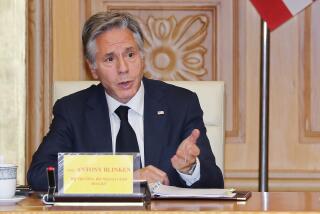Obama says Iran could be allowed a modest nuclear enrichment program
WASHINGTON — President Obama signaled Saturday that he was prepared to allow Iran to enrich uranium on its own soil, saying that a final deal could be structured to prevent Tehran from developing a nuclear bomb.
Obama also put the odds of success for the upcoming international negotiations with Iran at not “more than 50-50.”
Seeking to rebut criticism of a just-completed interim nuclear deal with the Islamic Republic, Obama said in an appearance sponsored by the Brookings Institution’s Saban Center for Middle East Policy that it was not realistic to try to force Iran to dismantle all of its multibillion-dollar nuclear complex.
In his most extensive comments on the subject, he said that Iran could be allowed a “modest” enrichment program, provided there was strong international monitoring to ensure that Tehran could not suddenly accelerate production to obtain a nuclear weapon.
“If we could create an option in which Iran eliminated every single nut and bolt of their nuclear program and forswore the possibility of ever having a nuclear program, and for that matter got rid of all its military capabilities, I would take it,” Obama said in a conversation with the center’s founder, Haim Saban, a Los Angeles businessman and Democratic fundraiser.
“But I want to make sure everybody understands it — that particular option is not available. So as a consequence, what we have to do is make a decision as to, given the options available, what is the best way for us to [ensure] Iran does not get a nuclear weapon?”
Negotiators from six world powers — the United States, Britain, France, Russia, China and Germany — signed an interim deal with Iran two weeks ago that will open the way for difficult negotiations over the next six months to try to ensure that Tehran is not able to reach a bomb-making capability.
The deal gives Iran temporary and limited relief from the tough sanctions on its economy over the next six months, in exchange for curbs intended to make certain that Tehran cannot advance its capabilities for building a bomb while the final talks are underway.
But Obama is struggling to sell the deal in the face of intense resistance from Congress, Israel, Saudi Arabia and others who fear it will leave Iran with the ability to secretly edge toward a nuclear weapons program. Congress may adopt new sanctions in the coming weeks that Obama fears could upset the fragile diplomacy before negotiations resume.
The comments marked the first time that Obama has acknowledged Iran could be granted international approval to enrich uranium to low levels, provided it satisfied world concerns about its nuclear program and agreed to intrusive monitoring. In the past, officials have sometimes publicly denied that they have made such a decision, though they sometimes have acknowledged privately that they might agree to such activities under certain conditions.
Obama rejected the arguments of Israeli Prime Minister Benjamin Netanyahu and other critics that, with threats of war and a further tightening of the sanctions chokehold, Iran could be forced to entirely surrender its nuclear program.
The idea that Iran, with more sanctions and military threats “could ultimately just say, ‘OK, we give in’ — I think does not reflect an honest understanding of the Iranian people or the Iranian regime,” Obama said.
Iranians across the political spectrum are going to insist on an outcome that provides them a “dignified resolution,” including retention of parts of the current program, and allows them to “reenter the international community,” the president said.
Iran has maintained that its nuclear program is for peaceful purposes.
Obama’s comments also provided a road map to his goals in the upcoming negotiations.
He said Iran would have to surrender its bomb-resistant underground enrichment facility at Fordow; its Arak heavy-water reactor, which could open the way to a plutonium-fueled bomb; and some — though not all — of its advanced centrifuges. None of those, he said, were necessary for a peaceful nuclear program intended for energy generation and medical uses.
Obama sought to play down the idea that the United States and Iran had hashed out much of the recent nuclear deal in secret negotiations.
He said there had been secret meetings after Iranian President Hassan Rouhani’s election in June, but those were aimed at finding out “how much room did they have to get something done.” Once the meetings got “more technical,” they were merged with the ongoing negotiations with the other five world powers, he said.
“There weren’t a lot of secret negotiations,” he said.
On a separate topic, Obama said it was possible that Israeli and Palestinian negotiators would be able to reach the outline of a peace deal in the next few months.
Obama said he thought there was a chance “over the next several months to arrive at a framework that does not address every single detail but gets us to a point where everybody recognizes — better to move forward than move backwards.”
More to Read
Start your day right
Sign up for Essential California for news, features and recommendations from the L.A. Times and beyond in your inbox six days a week.
You may occasionally receive promotional content from the Los Angeles Times.







